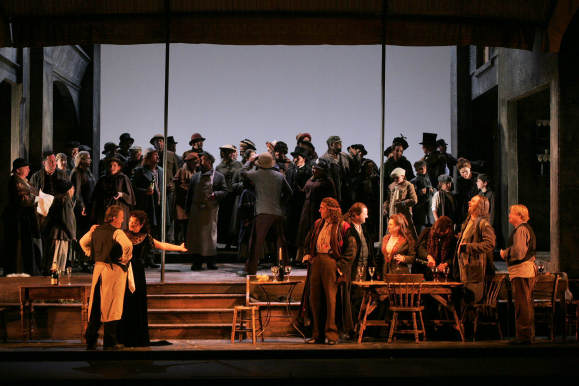Other Links
Editorial Board
-
Editor - Bill Kenny
-
Deputy Editor - Bob Briggs
Founder - Len Mullenger
Google Site Search
SEEN AND HEARD
UK OPERA REVIEW
Puccini, La Bohème: Soloists, Orchestra and Chorus of Welsh National Opera, Conductor Andrew Greenwood, Wales Millenium Centre, Cardiff 5.6. 2009 (LK)
Director Caroline Chaney (original production directed by Göran Järvefelt)
Designer, Michael Yeargan
Original Lighting Designer, John Waterhouse
Lighting realised by Ian Jones
Chorus Master, Stephen Harris
Cast:
Rodolpho, Gwyn Hughes Jones
Mimì, Naomi Harvey
Marcello, Jason Howard
Colline, David Soar
Schaunard, David Stout
Musetta, Victoria Joyce
Benoît, Howard Kirk
Parpignol, Huw Llewelyn
Alcindoro, Alastair Moore
Customs Official, Julian Boyce
Customs Sergeant, Laurence Cole
Children’s Chorus drawn from local primary schools

The Café Momus
People tend to believe that Puccini’s heroines are all helpless victims of fate, driven along by uncontrollable dark forces, an impression fostered
carefully
by the music’s easy seductiveness
but having very little to do with the actual characters. Tosca’s ‘dear little
hands’ for example – which we may all like to think of as cherishing her babies - turn
quickly to murder to achieve her ends. They’re figments of all our imaginations, including Cavaradossi’s.
There’s more. While Butterfly fits the helpless stereotype more easily than most, her choice of death over dishonour reveals an iron
clad will. Turandot will never turn into a loving wife in a month of Sundays, but she knows when she is beaten and needs to regroup - how long does anyone really give her marriage to Calaf? Only La Fanciulla’s Minnie wears Puccini’s true colours. This bible toting barmaid
storms in with
six-shooters blazing to save Johnson/ Ramirez, even though her illusions about him have
mostly been shattered. A girl can get a man with a gun - if her mind is
set on it.
Mimì is no exception to Puccini's general rule. From the beginning
of
La
Bohème we are hoodwinked into believing that she is a poor
little thing, while Musetta is a
scheming gold-digger who sleeps her way to fortune: but in fact they’re soul sisters
to the core. And though LOVE AT FIRST SIGHT is entrancing of course, Rodolpho doesn’t have to work
that hard to get Mimì into bed. She pointedly makes him
buy her favours and while the little pink bonnet with its careful connotations of innocence seems
on the surface a fairly low price for anyone to pay, in reality it costs
all of Rodolpho's cash.
Now before hordes of committed Bohème-ists scream that a Fanciulla-like lynching
is too good for me,
I should probably add quickly that none of this means that true love never springs from unlikely
soils. I am sure that Rodolpho - even though he decides that she's better off whoring with a
Viscount
- really does bring out the romantic in
Mimì.
It's just that she's a whole lot grittier than she lets on and has to be
tough as old boots (hold out for that bonnet, girl) on the one hand and a frail
besotted innocent on the other. That’s very a hard trick to pull
off - perhaps even one that's impossible - which is why (given our place in the dying embers of Victorian sensibility) she is often the least convincing character on stage.
The men are a lot better off. They set the tone of cheerful student life immediately; starving in their garret, none of them is even slightly worn down by their circumstances and in this production their hope was more than evident from the outset. Andrew Greenwood conducted with magnetism and excitement, and achieved first class responses from both orchestra and singers, not allowing the pace to slacken for a minute and getting inside the music with both sensitivity and vigour – something not always easy to achieve.
The performance turned into an ensemble triumph. Rodolpho, played by Gwyn Hughes
Jones, gave one of the best performances I have ever seen, being in command vocally
and dramatically at all turns complete with truly splendid top
notes. The unforgiving role of Mimì was taken by Naomi Harvey (substituting for Rebecca Evans) whose powerful voice dealt easily with the volume required for her character, but showed some problems at times with maintaining complete control. However, this is a minor criticism given the difficulties not only
of the vocal demands but also the challenge of making Mimì into a credible character.
The students, Jason Howard as Marcello David Soar as Colline, and David Stout as Schaunard, along with Victoria Joyce as Musetta, were also vocally excellent, their acting making the
plot's drama come together with absolute conviction – a tribute both to their skills and to the direction by Caroline Chaney in this Göran Järvefelt revival. Schaunard’s farewell to his old coat was perhaps one of the most beautifully sung parts of the whole opera - love is only love, but a good coat is multi-functional and a real friend in a cold world.
The sets and lighting from this 1984 production seemed not at all dated - given Jonathan Miller’s recent production with ENO - presenting a straightforward visual interpretation of what was happening on stage. They were simple, subdued in terms of colouring, but
very beautiful in their simplicity with lighting to show them off to their best advantage.
In short, this was a tremendous production of an old favourite which too often lacks conviction - a truly great tribute to a fine cast and conductor.
Lyn Kenny
Picture © Brian Tarr
Back to Top
Cumulative Index Page
